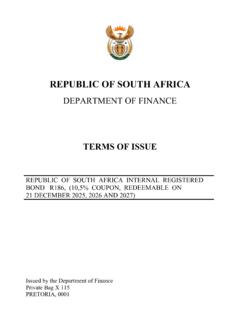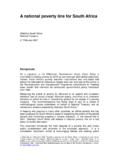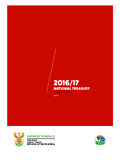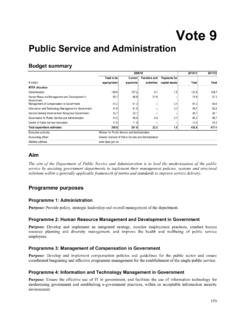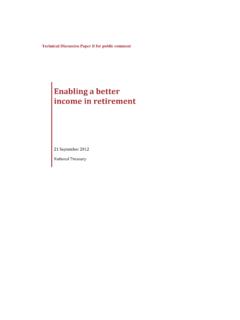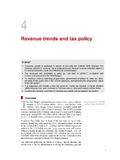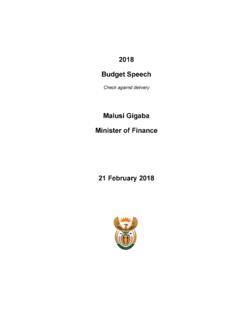Transcription of Intergovernmental relations and the local government ...
1 273 Intergovernmental relations and the local government fiscal framework Introduction south africa has an Intergovernmental system that is based on the principle of cooperation between the three spheres of government local , provincial and national. While responsibility for certain functions is allocated to a specific sphere, many other functions are shared among the three spheres. However, the Constitution specifically envisages that as municipalities develop the necessary capacity, the administration of many functions that are currently the responsibility of national and provincial government will be assigned to municipalities. While this has been taking place, very often the devolution has only been partial with municipalities not being given the necessary funds, scope of responsibilities or without their being subject to clear forms of accountability for their performance.
2 Over the medium term, government is planning for more functions to be devolved to municipalities. There is therefore a need for clear principles to guide such assignments to ensure that there are appropriate incentives, funding and accountability arrangements. The assignment of functions to local government has a direct bearing on the local government fiscal framework. Ideally, the framework should provide municipalities with access to revenue sources that are commensurate with the powers and functions that they are responsible for. In this regard, it is important to keep in mind that the whole local government fiscal framework is designed to fund local government , and not just the transfers from national government . It is also important to understand the relationship between the allocation of functions and the fiscal framework, the fiscal effort the municipality makes to collect revenues, the appropriate allocation of The assignment of functions to local government has a direct bearing on the local government fiscal framework 2011 local government BUDGETS AND EXPENDITURE REVIEW 28 those revenues to services, the responsible management of service delivery processes and the effective delivery of services.
3 The revenue-service link between municipalities and residents is key to fostering greater accountability. This suggests that requiring poor households to pay even very small amounts for services may deepen local democracy and municipal accountability. Municipal councils, mayors and municipal managers are responsible for ensuring that available revenues are collected, resources are allocated appropriately and procurement and service delivery processes are economical, efficient, effective and equitable. This chapter examines these issues under the following headings: Intergovernmental relations and the role of local government the local government fiscal framework services and the local government fiscal framework municipal councils role in the management of resources. Intergovernmental relations and the role of local government Chapter 3 of the Constitution describes the three spheres as being distinctive, interdependent and interrelated and enjoins them to cooperate with one another in mutual trust and good faith.
4 An important element of this cooperative relationship is that there needs to be a clear understanding of each sphere of government s powers and functions to ensure that a sphere of government or organ of state does not encroach on the geographical, functional or institutional integrity of government in another sphere . In addition to the Constitution, various legislation governs or organises the system of Intergovernmental relations (see text box below). Among other things, the legislation formalises the different spheres roles and responsibilities with regard to various functions and provides for a range of consultative structures. Legislation that organises Intergovernmental relations Intergovernmental Fiscal relations Act (1997) This Act sets out the process for the division of nationally raised revenues between the three spheres of government .
5 It establishes the Budget Forum, in which local government issues are discussed as part of the national budget process. It also requires that a Division of Revenue Bill is tabled annually, setting out (among other things) the amounts to be transferred to each municipality. Municipal Structures Act (1998) This Act provides for the establishment of different types of municipalities and the division of powers and functions between local and district municipalities. It also regulates the internal systems, structures and roles of office bearers of municipalities. The Municipal Systems Act (2000) This Act sets out detailed requirements in relation to community participation, integrated development planning, performance management, administration, service provision and debt collection. It also regulates the publication of by-laws and determines the role of national and provincial government in setting standards and monitoring local government .
6 The Act also governs the assignment of functions to a municipality from another sphere of government . Intergovernmental relations Framework Act (2005) This Act provides a framework for the establishment of Intergovernmental forums and mechanisms to facilitate the settlement of Intergovernmental disputes. The revenue-service link between municipalities and residents is key to fostering greater accountability CHAPTER 3: Intergovernmental relations AND THE local government FISCAL FRAMEWORE 29 The south African system of Intergovernmental relations is complex and continues to evolve as better modes of cooperation and coordination emerge and as functions are shifted between the spheres. The following key elements and principles underpin the Intergovernmental system: Accountability: Each sphere has specific constitutionally defined powers and responsibilities, is accountable to its legislature or council, and is empowered to set its own priorities.
7 The power of national government to intervene in provincial and local government matters, and provincial governments to intervene in local government matters, depends on whether the relevant sphere fails to carry out an executive obligation. Transparency and good governance: Accountability of political representatives to the electorate and transparent reporting arrangements within and between spheres is at the heart of the Intergovernmental system. While political executives are responsible for policy and outcomes, the accounting officers are responsible for implementation and outputs. Mutual support: National and provincial governments have a duty to strengthen the capacity of municipalities. Spheres of government must also act cooperatively towards each other, for instance through avoiding legal action until all other mechanisms have been exhausted.
8 Redistribution: The three spheres all have important roles to play in redistribution, but because inequalities exist across the country, the redistribution of resources is primarily a national function. Where provinces and municipalities undertake redistribution, the challenge is to do this in line with their fiscal capacity and not to undermine economic activity and their financial viability. Redistribution among the three spheres is achieved through the vertical division of revenue. Redistribution among provinces and municipalities is effected through their respective equitable share formulae. Vertical division: Determining allocations to each sphere of government inevitably involves trade-offs that are made in the course of a comprehensive budget process driven by political priorities, and which covers all aspects of governance and service delivery.
9 Separate and ad hoc requests for funds fragment the coherence of the budget and undermine the political process of prioritisation. Revenue-sharing: The fiscal system takes into account the fiscal capacity and functions assigned to each sphere. Provinces and municipalities are funded from own revenues, equitable share allocations, and conditional and unconditional grants. The grant system must be simple and comprehensive and not compensate provinces and municipalities that fail to collect own revenues. Broadened access to services: The Constitution and current government policy prioritises broadening access to services. The responsible spheres are expected to design appropriate levels of 2011 local government BUDGETS AND EXPENDITURE REVIEW 30 service to meet customer needs in an affordable manner, explore innovative and efficient modes of delivery, and leverage public and private resources to fund infrastructure.
10 Responsibility over budgets: Each sphere of government has the right to determine its own budget and the responsibility to comply with it. To reduce moral hazard and ensure fairness, national government will not bail out provinces or municipalities that mismanage their funds, nor provide guarantees for loans. Intergovernmental forums The Intergovernmental system depends on well-coordinated policy, planning, budgeting, implementation and reporting. This is necessary both within spheres and between spheres and is effected through technical, executive and legislative consultative forums. Municipalities are generally represented on the national Intergovernmental structures by organised local government in the form of the south African local government Association (SALGA). At the provincial level, municipalities are either represented directly or through the provincial local government associations.
